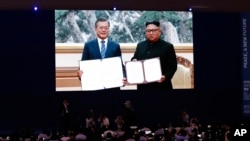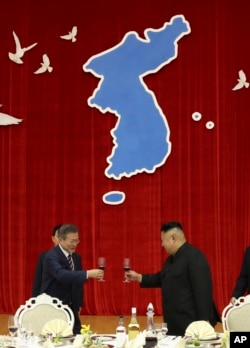The future of a milestone agreement between South Korea and North Korea, signed five years ago to reduce military tensions, is now uncertain following what Seoul considers a series of violations and military provocations by Pyongyang.
Signed by the two Koreas on September 19, 2018, the Comprehensive Military Agreement outlined steps to ease military tensions and prevent unintended accidents.
The signing took place during a period of reconciliation between Seoul and Pyongyang, but relations have soured in recent years.
North Korea has intensified its weapons programs, conducting numerous ballistic missile tests, including the launches of the Hwasong-18 solid-fuel intercontinental ballistic missile in April and July. Pyongyang has also pledged to launch a military reconnaissance satellite into orbit this year.
Tuesday, South Korean officials restated their reservations about continuing the implementation of the inter-Korean agreement.
“An agreement that is only kept unilaterally by us and not followed by North Korea is not desirable,” said officials from the Unification Ministry during a background briefing.
Last Friday, South Korea's defense minister nominee, Shin Won-sik, told reporters that he thought "it would be desirable to abolish the September 19 military agreement" because it would expose South Korea's "military vulnerability” amid North Korea’s repeated military provocations.
Seoul has been conducting a legal review on the suspension of the deal after North Korea launched five drones that crossed into South Korea on December 26, 2022. One of them flew over no-fly zones designated around the presidential office in Seoul, and the others flew near the west coast of the peninsula.
In January, South Korean President Yoon Suk Yeol threatened to suspend the deal if North Korea continues its provocations and invades South Korea’s territory again.
North Korea violated the pact 17 times from its signing in 2018 up to the end of 2022, according to South Korea’s defense white paper.
Former South Korean officials opposed the ending of the tension-reduction deal.
“Abolishing the inter-Korean military agreement would be irresponsible, akin to removing the last safety pin,” said former South Korean President Moon Jae-in on Tuesday during a public event that marked the fifth anniversary of its signing and the “September 19th Pyongyang Declaration.”
Both documents were signed when Moon traveled to Pyongyang in 2018 for direct talks with North Korean leader Kim Jong-un. The two Koreas agreed to end hostilities at fortified regions, including the Demilitarized Zone, as well as resolve family separation issues and further cultural exchanges.
“As relations deteriorate and military tensions increase, the military agreement must be kept to the end by the two Koreas to prevent the worst-case scenario and pave the way for dialogue,” Moon said.
Others maintained that the pact has reduced risks of a military conflict between the Koreas.
“Military tensions in the border area have eased,” said Choi Jong-kun, who was South Korea’s former first vice foreign minister.
He said the inter-Korean military agreement “has epoch-making measures to lower the threats of conventional war on the Korean Peninsula, including the sky, land and sea. And it has actually been implemented by two Koreas.”
Lee Juhyun contributed to this report.





